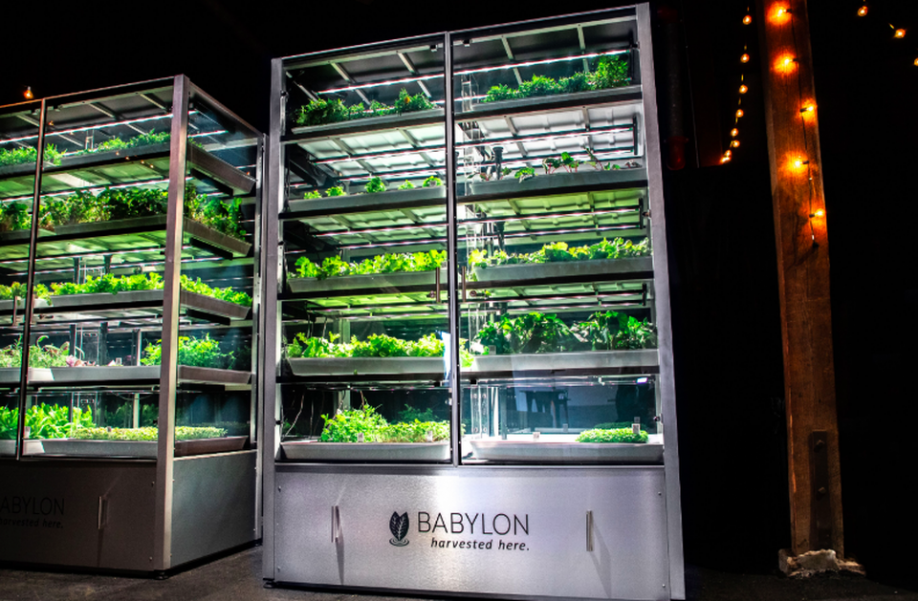We're building for a future where modular vertical farming solutions are an accessible means of food production in urban areas. By modular vertical farming solution, we are referring to turnkey grow systems from the size of a shipping container down to a household appliance.
 2021 Top Article - How Vertical Farming will shape the Post Pandemic Food Supply Chain
2021 Top Article - How Vertical Farming will shape the Post Pandemic Food Supply Chain

Q&A with Alexander Olesen, Co-Founder | Babylon Micro-Farms
Tell us about yourselves and Babylon Micro-Farms.
While still taking full course loads at the University of Virginia, we were actively involved in the Social Entrepreneur Program, a reflection of our values and determination to incubate a socially good company. Our original vision of starting an environmentally responsible company to provide fresh food to refugees living in camps by building hydroponic farms was put to the test when logistical realities of adequate power supply and access to clean water forced them to put that aspect of the business on hold. We became determined to develop a technology-based solution reducing the cost, complexity, and infrastructure requirements to grow fresh food. This technology is the backbone of Babylon’s platform today, the R&D has taken a dedicated effort for over 4 years. Our commitment to building Babylon into a successful company required an unforeseen amount of perseverance and we ran into a few issues along the way. We're now a team of 23 people working tirelessly towards the same goal of creating an integrated platform for modular vertical farming. It's inspiring to work alongside so many talented people and it's so rewarding to see how well our products are being received in the market and we're just getting started.
How have your customers' priorities shifted due to the pandemic?
Our institutional customers, predominantly from the education, healthcare, hospitality and senior living spaces, have had a completely different set of priorities since the advent of COVID. We have been amazed at their complete commitment to their people - staff, students, patients, residents and visitors. They were required to do an incredibly hard, fast pivot to safeguard the safety of the people they are responsible for and to and have done an outstanding job. Schools had to close their doors and learn how to operate virtually, hospitals were hit hard and continue to be, and the hospitality industry will take some time to recover. Senior living community residents have been the most vulnerable to the pandemic and the protocols that were put in place almost instantly have saved many lives. We are proud of how our partners responded to the ongoing public health crisis and that in the midst of all the challenges we continued to be able to supply them with fresh food, despite the lockdowns and quarantines. Our remote management system enabled us to make sure at least one thing stayed consistent for our partners during a difficult time for them.

How do you feel urban farming, and specifically modular indoor farming, addresses these new problems and priorities?
1. Supply chain resiliency - We provide peace of mind that fresh produce is being grown there on-site.
2. Reduced Food waste - Our customers love harvesting highly-perishable produce as needed and not having to waste anything
3. Improved Nutrition - We have much higher quality produce that is free from pesticides and it's helping our customers improve their diets.
How has the pandemic shaped the trajectory of indoor farming?
The pandemic has focused a very bright light on the frailty of our food systems and supply chain. The growth of the indoor farming industry has been rapidly escalating as a result, as demonstrated by the enormous sums being raised by companies that are actively involved in addressing the vulnerabilities and trying to ensure a safer, more sustainable and hopefully a more equitable food system for the future.
Why is Babylon’s software platform important to the industry? How is it different from what’s out there today?
We're solving a very different set of problems to most people in this industry. We're building for a future where modular vertical farming solutions are an accessible means of food production in urban areas. By modular vertical farming solution, we are referring to turnkey grow systems typically from the size of a shipping container down to a household appliance. We do not compete with the large industrial growers at all. Most companies in this emerging segment are focused on creating configurations of hydroponic system to optimize specific market, aesthetics, or certain crop varieties etc. There's nothing wrong with that and it's exciting to see all the innovation. However, our firm belief is that there is not a one size fits all solution to this market and that every modular vertical farming solution shares the same scalability challenges. These are the challenges we are trying to address through our remote management platform. The platform enables us to control semi-automated hydroponic systems through the cloud and aggregate the data from all the farms in our fleet. We combine this with an automated inventory fulfilment system that enables us to prepare a ship consumables to our customers while they interact with their farm through a simple app. The software infrastructure we are developing creates a superior user experience for the end consumer and provides data analysis that is critical to scaling support for a distributed network of vertical farms. In this way, we seek to be an enabling platform that can help grow the market for modular vertical farming solutions as an accessible alternative to large scale, capital intensive, commercial growers.
What is Babylon’s vision for the future?
See above. We envision a world where controlled environment crop cultivation becomes the predominant source of major highly-perishable produce categories, such as, leafy greens, herbs, vine crops, berries etc.. As the market grows we need modular vertical farming solutions that are accessible and can scale more easily than the large scale, capital intensive, commercial operations that dominate the headlines today. These solutions are not mutually exclusive and we need both in order to reform our food system. New technologies and new businesses models are making modular vertical farms viable. We're aiming to be the platform that drives this segment forward.

About Alexander Olesen
Alexander Olesen, CEO, and Co-founder of Babylon has embraced and excelled at every opportunity he has encountered, from academic challenges to bootstrapping his second company, Babylon Micro-Farms, at the age of just 21 while still taking a full course load at the University of Virginia. Originally from England, Alexander relocated to attend the University and was actively involved in the Social Entrepreneur Program, a reflection of his values and determination to incubate a socially good company. The original research into the technology that became the basis for Babylon's success was based on research to provide low-cost food systems for refugees. He maintains the vision for the company and is an expert at managing people and bringing on partners and investors.
The content & opinions in this article are the author’s and do not necessarily represent the views of AgriTechTomorrow
Comments (0)
This post does not have any comments. Be the first to leave a comment below.
Featured Product

